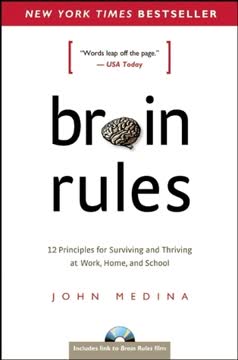Searching...
Top 10 Books on Child Development and Learning Insights
Explore these 10 must-read books on child development, learning, and parenting strategies that challenge traditional views and inspire new approaches.
Book Summaries
12 Revolutionary Strategies to Nurture Your Child's Developing Mind, Survive Everyday Parenting Struggles, and Help Your Family Thrive
Daniel J. Siegel, a renowned child psychiatrist, provides practical strategies for parents to nurture emotional intelligence and resilience in their children through understanding brain development.
3 Key Takeaways:
- Integrate the left and right brain for emotional balance
- Build the "upstairs brain" for better decision-making
- Help children process memories to heal from difficult experiences
12 Principles for Surviving and Thriving at Work, Home, and School
John Medina, a developmental molecular biologist, presents engaging insights into how the brain works and offers practical rules for enhancing learning and cognitive function.
3 Key Takeaways:
- Exercise boosts brain power and cognitive performance
- The human brain evolved to adapt to changing environments
- Every brain is wired differently, affecting learning and intelligence
The Search for the True Self
Alice Miller's influential work explores the impact of childhood trauma on adult psychology, offering insights into the importance of authentic self-expression and emotional awareness.
3 Key Takeaways:
- Childhood experiences shape adult behavior and mental health
- The "gifted child" often sacrifices true self for parental approval
- Depression and grandiosity are two sides of the same coin
The Modern Denial of Human Nature
Steven Pinker, a renowned cognitive scientist, argues against the idea of the 'blank slate' and presents evidence for the biological underpinnings of human behavior and learning.
3 Key Takeaways:
- Human nature is shaped by both biology and culture
- The Blank Slate doctrine has been disproven by modern science
- Innate mental faculties are universal across cultures
Peter O. Gray, a retired professor and advocate for self-directed learning, presents compelling arguments for the importance of free play in children's development, challenging conventional schooling methods.
3 Key Takeaways:
- Children's natural instincts for self-education are stifled by modern schooling
- Hunter-gatherer societies exemplify ideal conditions for children's learning
- The rise of agriculture and industry led to the decline of children's freedom
John C. Holt, a pioneer in education reform, challenges traditional schooling methods and advocates for a child-centered approach that fosters natural curiosity and exploration.
3 Key Takeaways:
- Children are natural learners, driven by curiosity and exploration
- Fantasy and play are essential tools for children's learning and development
- Traditional schooling often hinders natural learning processes
The Child at Home, from Birth to Age Three
Paula Polk Lillard, an expert in Montessori education, provides practical guidance for parents on fostering independence and respect in children from birth to age three.
3 Key Takeaways:
- Montessori's Vision: Aiding the Child's Self-Formation
- The Importance of a Prepared Environment for Infants
- Developing Coordinated Movement and Hand-Brain Connection
What Young Children Really Need from Grownups
Erika Christakis, an early childhood educator, emphasizes the significance of play and meaningful adult interactions in fostering children's natural curiosity and development.
3 Key Takeaways:
- Early childhood is a critical period of powerful learning and development
- Play is essential for cognitive, social, and emotional growth
- Language-rich environments foster literacy and communication skills
Why Everything You've Been Told About Genetics, Talent, and IQ Is Wrong
David Shenk's thought-provoking book challenges the notion of fixed intelligence and talent, emphasizing the role of environment and effort in shaping abilities.
3 Key Takeaways:
- Genes interact dynamically with the environment, shaping our potential
- Intelligence and talent are not fixed, but develop through deliberate practice
- Child prodigies don't always become extraordinary adults












